| Listing 1 - 10 of 14 | << page >> |
Sort by
|
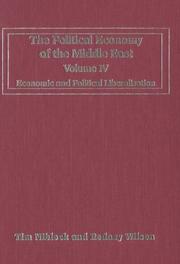

ISBN: 1858989388 Year: 1999 Publisher: Cheltenham : Elgar,
Abstract | Keywords | Export | Availability | Bookmark
 Loading...
Loading...Choose an application
- Reference Manager
- EndNote
- RefWorks (Direct export to RefWorks)
Book
Year: 2016 Publisher: Carlisle, PA Strategic Studies Institute and U.S. Army War College Press
Abstract | Keywords | Export | Availability | Bookmark
 Loading...
Loading...Choose an application
- Reference Manager
- EndNote
- RefWorks (Direct export to RefWorks)
Security, International --- National security --- Arab cooperation. --- International cooperation. --- Arab countries --- Arab countries. --- Military relations.
Book
ISBN: 0755609085 1283380552 9786613380555 0857720244 Year: 2011 Publisher: London ; New York : I.B. Tauris,
Abstract | Keywords | Export | Availability | Bookmark
 Loading...
Loading...Choose an application
- Reference Manager
- EndNote
- RefWorks (Direct export to RefWorks)
"The GCC, made up of Saudi Arabia, Bahrain, Kuwait, Oman, Qatar and the UAE, is one of the most resilient sub-regional organizations in the world, and the most successful in the one in the Arab world. It has been the forum through which much internal security co-operation in this volatile sub-region has taken place, as well as the main representative for the UAE's territorial dispute with Iran over the Aub Musa and Tunbs Islands. It also has significant potential to present an alternative form of leverage over the international oil markets. Very little is known however about how the organization really works: how decisions are actually taken, as opposed to how this process is formally constituted in its charters, and what the GCC's real impact on member states, the Gulf and international relations is. Drawing on cutting-edge IR theoretical perspectives as well as unique first-hand access to GCC decision-makers, Matteo Legrenzi explains the mechanisms of Gulf cooperation - and its limitations - in the context of economic globalisation, diplomatic regionalisation and the rise of Iran. Combining historical context, primary source investigations and theoretical analysis, it is the first comprehensive guide to the GCC and an indispensable resource for anyone concerned with the Gulf and the Middle East."--Bloomsbury Publishing.
Arab cooperation. --- Gulf Cooperation Council. --- Persian Gulf States --- Economic integration. --- Foreign relations.
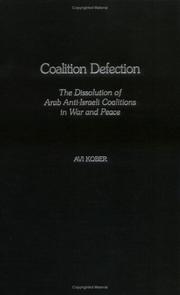
ISBN: 0275977226 Year: 2002 Publisher: Westport, CT : Praeger,
Abstract | Keywords | Export | Availability | Bookmark
 Loading...
Loading...Choose an application
- Reference Manager
- EndNote
- RefWorks (Direct export to RefWorks)
Arab-Israeli conflict. --- Arab cooperation --- Coalitions --- Conflit israélo-arabe --- Coopération arabe --- Coalition --- Arab countries --- Israel --- Etats arabes --- Israël --- Relations --- Politics and government --- Politique et gouvernement
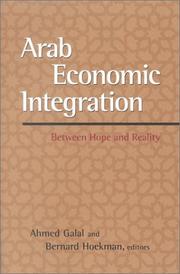
ISBN: 0815730314 0815796013 9780815796015 Year: 2003 Publisher: Cairo : Washington, D.C. : Egyptian Center for Economic Studies ; Brookings Institution Press,
Abstract | Keywords | Export | Availability | Bookmark
 Loading...
Loading...Choose an application
- Reference Manager
- EndNote
- RefWorks (Direct export to RefWorks)
A Brookings Institution Press and the Egyptian Center for Economic Studies (ECES) publication Improving the economic performance of Arab countries is now more critical than ever. The region faces high population growth rates, rising unemployment, and modest economic growth coupled with increasingly intense competition from emerging markets in eastern Europe, Latin America, and Asia. Meeting these challenges requires finding ways to overcome political obstacles that impede socially beneficial economic reforms. Despite fifty years of repeated attempts at Arab economic integration, the results in
International economic relations --- Arab States --- ARB / Arab Countries --- 334.12 --- 334.10 --- 333.432.0 --- Economische unies. --- Algemene economie : algemeenheden. --- Monetaire akkoorden en conventies: algemeenheden. --- Arab cooperation --- International cooperation --- Panarabism --- Monetaire akkoorden en conventies: algemeenheden --- Algemene economie : algemeenheden --- Economische unies --- Arab countries --- Economic integration. --- Arab states --- Arab cooperation. --- Economic conditions.
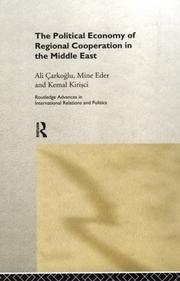
ISBN: 0415194458 1280143800 0203982495 1134648871 9780203982495 9780415194457 9781134648825 9781134648863 9781134648870 1134648863 Year: 1998 Publisher: London ; New York : Routledge,
Abstract | Keywords | Export | Availability | Bookmark
 Loading...
Loading...Choose an application
- Reference Manager
- EndNote
- RefWorks (Direct export to RefWorks)
This book explores the current anatomy of regional cooperation and why it has often failed to take hold. It offers an alternative view of politics and international relations in the Middle East. The findings show that co-operation between many of the more open regimes, such as Israel, Jordan, Egypt, Palestine and Turkey can pave the way to increased stability in the region.The authors argue that focusing on international and regional factors alone is insufficient in explaining the prevailing instability in the region. Instead they highlight domestic factors as crucial to understanding conf
Arab cooperation. --- Arab cooperation --- Economic History --- Business & Economics --- International cooperation --- Panarabism --- Middle East --- Economic integration. --- Economic conditions --- Foreign economic relations. --- Asia, South West --- Asia, Southwest --- Asia, West --- Asia, Western --- East (Middle East) --- Eastern Mediterranean --- Fertile Crescent --- Levant --- Mediterranean Region, Eastern --- Mideast --- Near East --- Northern Tier (Middle East) --- South West Asia --- Southwest Asia --- West Asia --- Western Asia --- Orient
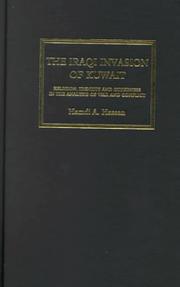
ISBN: 1849640378 0585426341 9781849640374 9780585426341 0745314163 9780745314167 0745314163 9780745314167 0745314112 9780745314112 0745314112 9780745314112 Year: 1999 Publisher: London ; Sterling, Va. : Pluto Press,
Abstract | Keywords | Export | Availability | Bookmark
 Loading...
Loading...Choose an application
- Reference Manager
- EndNote
- RefWorks (Direct export to RefWorks)
Persian Gulf War, 1991. --- Panarabism. --- Pan-Arabism --- Arabism --- Panislamism --- Arab cooperation --- Desert Storm, Operation, 1991 --- Gulf War, 1991 --- Operation Desert Storm, 1991 --- War in the Gulf, 1991 --- Iraq-Kuwait Crisis, 1990-1991 --- Persian Gulf Region --- Politics and government. --- Politics and government --- Panarabism
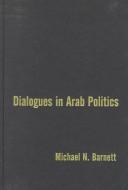
ISBN: 0231109199 Year: 1998 Publisher: New York Columbia University Press
Abstract | Keywords | Export | Availability | Bookmark
 Loading...
Loading...Choose an application
- Reference Manager
- EndNote
- RefWorks (Direct export to RefWorks)
Pan-Arabism --- Panarabism --- Panarabisme --- 812 Ideologie --- 815 Geschiedenis --- 821.1 Volkenrecht --- 841 Politiek Bestel --- 846 Identiteit --- 846.1 Etniciteit --- 850 Vrede- en conflictstudies --- 883.4 West-Azië --- Nationalism --- -Consciousness, National --- Identity, National --- National consciousness --- National identity --- International relations --- Patriotism --- Political science --- Autonomy and independence movements --- Internationalism --- Political messianism --- Arabism --- Panislamism --- Arab cooperation --- Arab countries --- -Arab countries --- -Arab world --- Arabic countries --- Arabic-speaking states --- Islamic countries --- Middle East --- Politics and government --- Foreign relations --- -Politics and government --- -Pan-Arabism --- Consciousness, National --- Foreign relations. --- Politics and government.
Book
ISBN: 9781108429146 1108429149 9781108453158 1108453155 9781108614443 1108626432 1108617212 1108614442 9781108617215 9781108626439 Year: 2018 Publisher: Cambridge, England : Cambridge University Press,
Abstract | Keywords | Export | Availability | Bookmark
 Loading...
Loading...Choose an application
- Reference Manager
- EndNote
- RefWorks (Direct export to RefWorks)
Framed by a critical analysis of global capitalism, this book examines how the six states of the Gulf Cooperation Council are powerfully shaping the political economy of the wider Middle East. Through unprecedented and fine-grained empirical research - encompassing sectors such as agribusiness, real estate, finance, retail, telecommunications, and urban utilities - Adam Hanieh lays out the pivotal role of the Gulf in the affairs of other Arab states. This vital but little recognised feature of the Middle East's political economy is essential to understanding contemporary regional dynamics, not least of which is the emergence of significant internal tensions within the Gulf itself. Bringing fresh insights and a novel interdisciplinary approach to debates across political economy, critical geography, and Middle East studies, this book fills an important gap in how we understand the region and its place in the global order.
Arab cooperation --- #SBIB:328H512 --- #SBIB:327.1H10 --- International cooperation --- Panarabism --- Instellingen en beleid: Midden-Oosten / landen in het Midden-Oosten --- Internationale betrekkingen: theorieën --- Gulf Cooperation Council. --- Gulf Co-operation Council --- Co-operation Council for the Arab States of the Gulf --- States of Gulf Co-operation Council --- Golf-Rat --- GCC --- G.C.C. --- Majlis al-Taʻāwun al-Khalījī --- Majlis al-Taʻāwun al-Khalījī al-ʻArabī --- GKR --- Kooperationsrat Arabischer Staaten am Golf --- Cooperation Council for the Arab States of the Gulf --- Duwal Majlis al-Khalīj --- Gŏlpʻŭ Hyŏmnyŏk Wiwŏnhoe --- Kŏlpʻŭ Hyŏmnyŏk Wiwŏnhoe --- Majlis al-Taʻāwun li-Duwal al-Khalīj al-ʻArabīyah --- Golfkooperationsrat --- AGCC --- A.G.C.C. --- Duwal Majlis al-Taʻāwun al-Khalījī --- Sovet sotrudnichestva arabskikh gosudarstv Persidskogo zaliva --- SSAGPZ --- Arab Gulf Cooperation Council --- مجلس التعاون الخليجي --- مجلس التعاون لدول الخليج العربية --- Shūrā-yi Hamkārī-i Khalīj-i Fārs --- شوراى همکارى خليج فارس --- Persian Gulf Cooperation Council --- PGCC --- Conseil de coopération du Golfe --- Gulf Cooperative Council --- Persian Gulf Region --- Economic integration. --- Economic policy. --- Politics and government --- Arab cooperation. --- POLITICAL SCIENCE / Government / International. --- Consiglio di cooperazione del Golfo --- Ccg
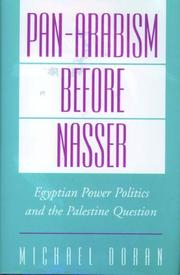
ISBN: 0195123611 1602563128 0195352521 1280838167 1602567670 1423735269 9786610838165 1280471506 0195160088 019985453X 9780195352528 9781423735267 9780195123616 9781602563124 Year: 1999 Publisher: New York, New York : Oxford University Press,
Abstract | Keywords | Export | Availability | Bookmark
 Loading...
Loading...Choose an application
- Reference Manager
- EndNote
- RefWorks (Direct export to RefWorks)
This book aims to alter profoundly the accepted version of the history of post-World War II Egyptian foreign policy. To this end, Doran convincingly demonstrates the absence of any true pan-Arab front from the very beginning of the Arab League. Reconsidering Cairo's policy decisions during the critical years from 1944 to 1948, he proves that Egyptian national interests were always placed before the united Arab front against Israel. Even while participating in the 1948 war with Israel, Egypt regarded Zionism and the Palestine Question as less important than achieving independence from Britain a
Arab-Israeli conflict. --- Egypt -- Foreign relations -- Arab countries. --- Egypt -- Politics and government -- 1919-1952. --- Electronic books. -- local. --- Panarabism. --- Panarabism --- Arab-Israeli conflict --- Regions & Countries - Africa --- History & Archaeology --- Egypt --- Politics and government --- Foreign relations --- Israel-Arab conflicts --- Israel-Palestine conflict --- Israeli-Arab conflict --- Israeli-Palestinian conflict --- Jewish-Arab relations --- Palestine-Israel conflict --- Palestine problem (1948- ) --- Palestinian-Israeli conflict --- Pan-Arabism --- Egypte --- Ägypten --- Egitto --- Egipet --- Egiptos --- Miṣr --- Southern Region (United Arab Republic) --- Egyptian Region (United Arab Republic) --- Iqlīm al-Janūbī (United Arab Republic) --- Egyptian Territory (United Arab Republic) --- Egipat --- Arab Republic of Egypt --- A.R.E. --- ARE (Arab Republic of Egypt) --- Jumhūrīyat Miṣr al-ʻArabīyah --- Mitsrayim --- Egipt --- Ijiptʻŭ --- Misri --- Ancient Egypt --- Gouvernement royal égyptien --- International relations. Foreign policy --- National movements --- anno 1940-1949 --- anno 1950-1959 --- Israel --- Palestine --- Palestinian Arabs --- Arabism --- Panislamism --- Arab cooperation --- History --- Égypte --- جمهورية مصر العربية --- مِصر --- مَصر --- Maṣr --- Khēmi --- エジプト --- Ejiputo --- Egypti --- Egypten --- מצרים --- United Arab Republic
| Listing 1 - 10 of 14 | << page >> |
Sort by
|

 Search
Search Feedback
Feedback About UniCat
About UniCat  Help
Help News
News